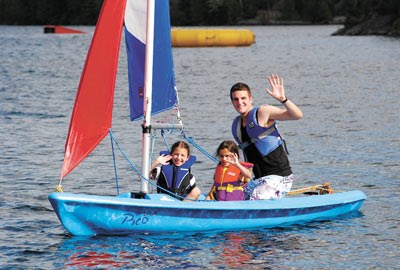As the last day of school draws nearer, parents are beginning to wonder how they will keep their kids occupied all summer.
For some, summer camp may be the answer.
“Camp (is a) great place for children to really be themselves,” Anna Maclennan, program director at Canadian Adventure Camp, located on Lake Temagami, said.
Canadian Adventure Camp (CAC) offers two-week residential camping experiences for children aged five to 16. The camp is located about two-and-a-half hours north-east of Sudbury.
Maclennan said campers of all ages can benefit from camp, and have a good time while they are at it.
“Having children go to summer camp is a really great experience for them to try new skills,” she said. “(They) also gain confidence by taking risks they wouldn’t normally take, (by) trying things that are a bit out of their comfort zone.”
She said the rock-climbing wall at CAC is a perfect example. Climbing may be something campers have never tried before, but once they do it, they are filled with a new sense of accomplishment.
At CAC, campers use a letter-based communication system to be in touch with family and friends at home.
By writing, instead of phoning, children are more likely to get through the first few days of camp without feelings of homesickness interrupting their experience.
“We feel that it can help children push through those initial (homesick) feelings,” Maclennan said. “It allows them to get over that.”

There is a place for everyone at camp.
Anna Maclennan,
program director, Canadian Adventure Camp
She said when campers overcome the urge to leave early, it helps them to develop into more confident people later on in life.
Maclennan suggested parents sit down with their children and talk before sending them to camp for the first time.
“If parents can kind of help prepare their children in advance, it really means that the first few days aren’t so rocky, and (the children) can just get straight to enjoying themselves,” Maclennan said. “Prevention is better than a cure.”
Some parents may worry that talking about homesickness before camp will give their children ideas, but Maclennan said talking about it often gives kids the opportunity to express their concerns.
“Speaking to your children before you go to camp is really the best idea,” she said.
She also suggested parents send their children on a “trial run” before sending them to a summer camp.
Having kids spend a night at a friends house can often help them overcome the anxieties they have about going to an overnight camp.
The sense of community campers feel at CAC can often help erase their worries, too.
At CAC, counsellors and staff emphasize human interaction and face-to-face communication. Maclennan said forming human friendships is much different than forming online friendships, through social networking sites such as Facebook. She also explained, that by banning electronics and music players from camp, children are more likely to engage each other.
“Often, iPods and those sorts of things can be used to cut off people,” she said.
When children are at camp, they also have the opportunity to interact with people they may not befriend otherwise.
Maclennan said having a “fresh start” at camp can be an incredible character-builder.
“They don’t need to hide anything about themselves,” she said. “There is a place for everyone at camp.”
Maclennan said teenaged campers especially can leave the camp with the confidence they need to deal with issues like peer-pressure. “For some children, high school can be a very challenging experience,” she said. “There’s definitely a lot of peer expectations.”
Summer camps are designed to help adolescents learn to make decisions, get more acquainted with their likes and dislikes, and learn they don’t have to change them for others, she said.
Maclennan said many campers grow into more purposeful people as a result of attending camp.
“(Going to camp) really helped them with their confidence, and they are much more sure of who they are.”
